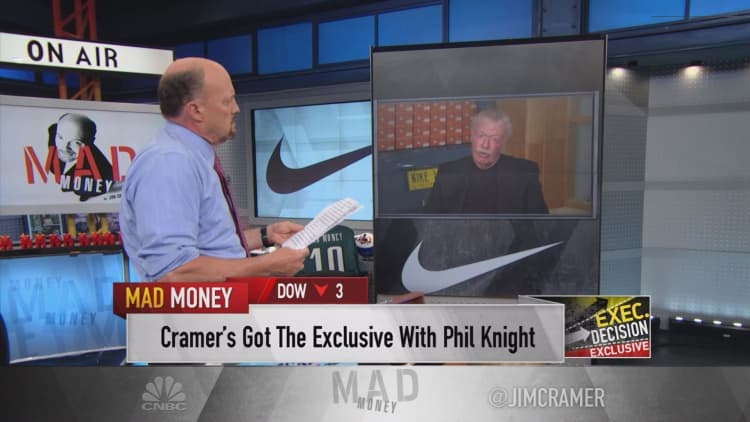In the late 1990s, Howie Busch was working to build his career as a lawyer in the professional sports industry. He and his wife were living in New York and had just welcomed a baby boy. Things were going well.
During his time in law school at Yeshiva University, Busch had befriended an NFL player who was studying during his off season. That connection introduced Busch to other football players and helped his burgeoning career in the legal management of athletes.
Then one day, his phone rang.
"I got a call from some guy who was working out of his grandmother's basement," Busch tells CNBC Make It. It was late 1996 or early 1997, he recalls.
"He was like, 'Listen I got your name from so-and-so, I hope you don't mind. I'm doing a deal with ... NFL Europe. Can you draft and negotiate the deal?" Busch, happy for business, agreed.
As Busch talked with the client, he was intrigued by the business, which sold a new type of athletic clothing.
"What I loved was he had a problem that he found when he was playing college football, and he solved that problem with a better material for a shirt," Busch says. "He was going to equipment managers and saying, 'Hey can you give these to your guys?'"
That cold call was from Kevin Plank and the business was Under Armour. The product he was then selling were Under Armour's early apparel designs.
Plank was a special teams football player at University of Maryland before graduating with a degree in business administration in 1996. He always hated that the cotton t-shirts he wore to play would become soaked with sweat. He wanted to create something that could dry quickly.
"I was a not-big-enough, not-fast-enough football player who wanted a little bit of an edge on the field," Plank told the Washington Post in 2014. "I figured my own sweat, if I could get that off my body, and more importantly, the weight that stood behind it, that would help. So the idea was why doesn't someone make a better alternative for a short-sleeve cotton t-shirt in the summer and a long-sleeve cotton t-shirt in the winter."
Plank started with just $15,000 and kept inventory in his grandma's basement in Washington D.C. Today Under Armour has a $7 billion market cap.
But when Busch got the call, Plank was just a young entrepreneur with big dreams. So when Plank offered to pay Busch for the legal work with equity in his start-up, Busch said no. He took cash instead.
Busch's wife had cautioned, "We don't know this guy. He's working out of his grandmother's basement!"
"I kind of wanted to roll the dice, but I thought, 'She's right, let's just take the money,'" he recalls.
For Busch, it was a multimillion-dollar mistake.
As Under Armour grew, Busch carried on with his own career. He even founded an apparel business, Dude Robe.
When Busch pitched his company on season 9 of ABC's "Shark Tank," he told his story of missed opportunity. The equity today would be worth, "probably about $250 million or so," Busch says on the show.
"It's a hell of a story Howie," investor Kevin O'Leary laughs on "Shark Tank."
Under Armour did not return a request for comment.
Dude Robe sells hoodies, sweat pants and shorts that are lined with a towel-like material in order to create a comfortable robe for men that doesn't seem "creepy," as Busch puts it. A classic Dude Robe sells for $74.95, while a pair of Dude Shorts sells for $49.95.
"It looks like regular shorts or a hoodie, but inside you have this comfortable and drying capability," says Busch.
Since the business launched with a Kickstarter in May 2017, Busch says it has brought in over $100,000 in sales. Although he didn't land an investment on "Shark Tank," Busch hopes to hit over $500,000 in sales in 2018. While the business doesn't compare to Under Armour yet, Busch says he's created a product he believes in.
"In all honesty I am really not somebody who looks back with regret," he says. "You move on and it's all just part of your history."
Don't miss: Nike co-founder Phil Knight: I was told I wouldn't make it. Here's how I did it anyways
Like this story? Like CNBC Make It on Facebook!



